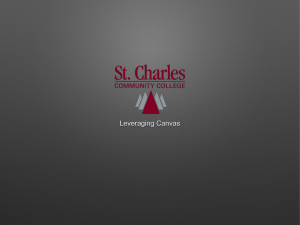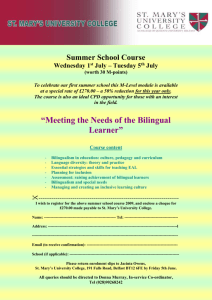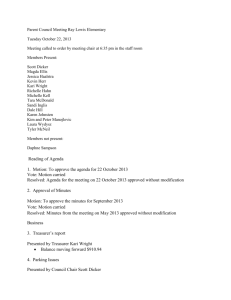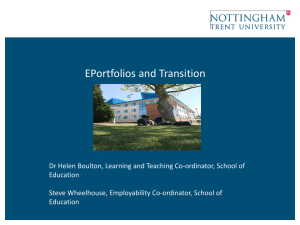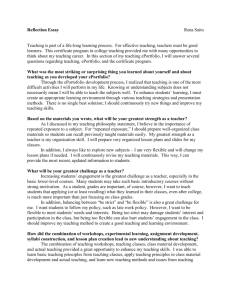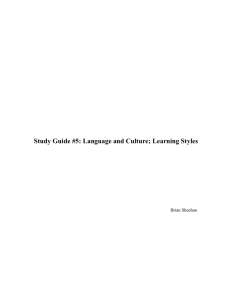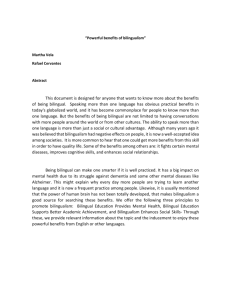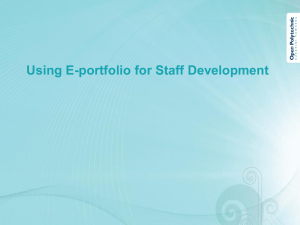ELN101 INTRODUCTION TO BILINGUALISM
advertisement
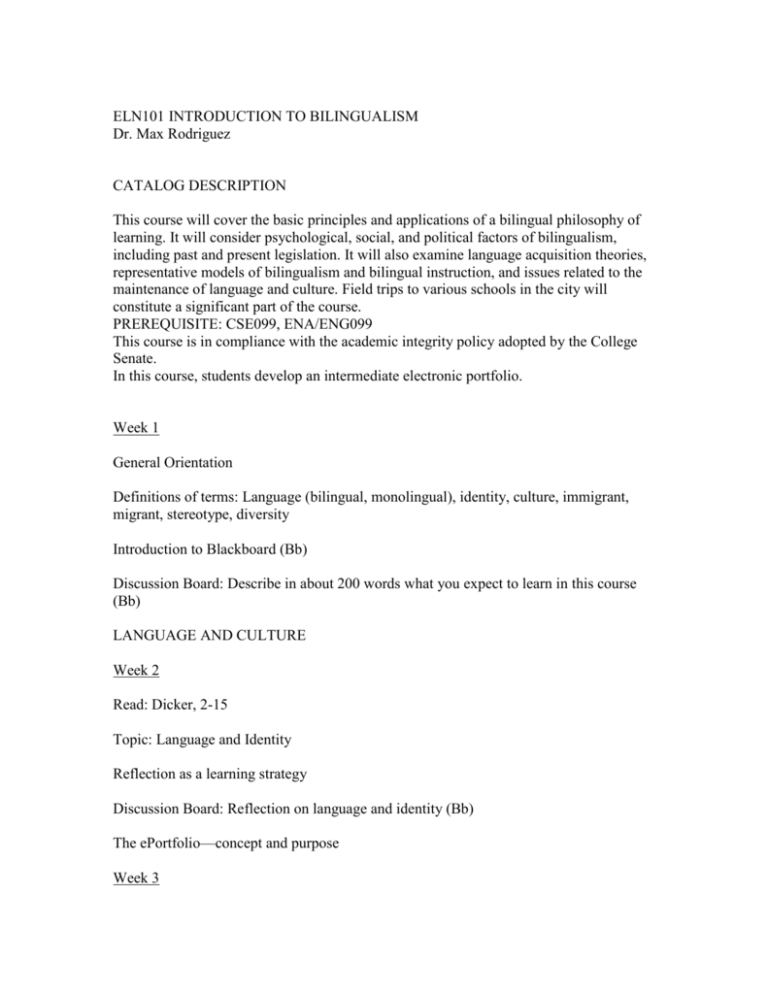
ELN101 INTRODUCTION TO BILINGUALISM Dr. Max Rodriguez CATALOG DESCRIPTION This course will cover the basic principles and applications of a bilingual philosophy of learning. It will consider psychological, social, and political factors of bilingualism, including past and present legislation. It will also examine language acquisition theories, representative models of bilingualism and bilingual instruction, and issues related to the maintenance of language and culture. Field trips to various schools in the city will constitute a significant part of the course. PREREQUISITE: CSE099, ENA/ENG099 This course is in compliance with the academic integrity policy adopted by the College Senate. In this course, students develop an intermediate electronic portfolio. Week 1 General Orientation Definitions of terms: Language (bilingual, monolingual), identity, culture, immigrant, migrant, stereotype, diversity Introduction to Blackboard (Bb) Discussion Board: Describe in about 200 words what you expect to learn in this course (Bb) LANGUAGE AND CULTURE Week 2 Read: Dicker, 2-15 Topic: Language and Identity Reflection as a learning strategy Discussion Board: Reflection on language and identity (Bb) The ePortfolio—concept and purpose Week 3 Read: Dicker, 15-25 Topic: Language and Culture Writing Workshop # 1: Research, annotation, and bibliographic references The research project Discussion Board: Reflection on the status of non-native English speakers in the United States (Bb) The ePortfolio—exploring the site PSYCHOLOGICAL, SOCIAL AND POLITICAL FACTORS OF BILINGUALISM Week 4 Read: Dicker, 38-47 and 51-57 Topic: Immigrant language experience in America Preview in class: Journey to America (VHS700) DUE: WORKING BIBLIOGRAPHY Discussion Board: Assimilation or acculturation: Which choice do immigrants have? Explain. (Bb) The ePortfolio—introduce template choices Week 5 Read: Dicker, 58-73 Topic: Language Loss and Maintenance DUE DRAFT # 1: ABOUT ME: WHEN AND HOW I LEARNED A SECOND LANGUAGE Writing Workshop # 2: Quick Outline Discussion Board: Is native language loss inevitable and/or desirable for recent immigrants? (Bb) The ePortfolio—downloading a template and depositing work in MY COLLECTION LANGUAGE ACQUISITION THEORY Week 6 Read: Dicker, 82-102 Topic: Second language acquisition theory and methods DUE: RESEARCH PAPER OUTLINE Discussion Board: Is there an optimum age to learn a second language? Why? Why not? (Bb) Week 7 Read: Dicker, 103-113 Topic: Stages of second language acquisition DUE: ABOUT ME The ePortfolio—developing the Welcome page, depositing About Me in MY COLLECTION BILINGUAL EDUCATION MODELS Week 8 Read: Dicker, 116-117, 121-123, 125-127, 129-131 Topic: Structured immersion, transitional, and maintenance DUE: DRAFT #1 RESEARCH PROJECT (Peer Critique) Discussion Board: Describe the goals of one model: structured immersion, transitional, or maintenance (Bb) The ePortfolio—adding images to text, annotation and Links page, depositing draft of reseach project in MY COLLECTION Week 9 Read: Dicker, 149-156 Topic: Dual language, two-way immersion Discussion Board: Write a short letter to the editor of your local newspaper in support or against bilingual education (Bb) The ePortfolio—developing the Classes and Projects page PAST AND PRESENT LEGISLATION Week 10 Topic: DUE: RESEARCH PROJECT Discussion Board: Brainstorming the reflection essay (Bb) The ePortfolio—depositing the research project in MY COLLECTION Week 11 Dicker, 164-169 Topic: Attitudes toward language pluralism in the United States DUE: DRAFT #1 REFLECTION ESSAY (Peer critique) The ePortfolio—zipping and uploading materials to the portfolio ePortfolio Showcase NEW HORIZONS Week 12 Dicker, 311-319 Topic: The role of bilingualism in a pluralistic society DUE: REFLECTION ESSAY ePortfolio—catch-up session Week 13 Course summary REQUIRED TEXT Susan J. Dicker. Languages in America: A Pluralistic View. 2nd Ed. Buffalo: Multilingual Matters Ltd., 2003. PERFORMANCE OBJECTIVES At the end of the course, the student will: 1. Demonstrate familiarity with the history of bilingual education in the United States and selected countries abroad; 2. Compare and contrast two major bilingual education models identifying rationale, goals and basic components; 3. Be familiar with first and second language acquisition theory. COURSE REQUIREMENTS NOTE: LATE ASSIGNMENTS WILL NOT BE ACCEPTED! Research Project 25% About Me 15% Reflection 10% Letter to Elected Official 10% Discussion Boards 15% Electronic Portfolio 10% Class participation 5% Homework 5% Professional behaviors 5% Total 100% ATTENDANCE POLICY LaGuardia Community College’s attendance policy allows students 15% of unexcused absences. The Department of Education and Language Acquisition subscribes to this policy and enforces it as follows: The absolute maximum of unexcused absences in this course is five (5) hours. There is no need to present any documentation. Excused absences are at the discretion of the instructor. There are extenuating circumstances that warrant excuse. Consult the instructor. Tardiness is disruptive to the learning process, therefore after ten (20) minutes students are marked absent for that hour. PROFESSIONAL BEHAVIORS Students are expected to practice professional behaviors that are conducive to creating an optimum learning environment that fosters successful work habits that may be applied in any setting. Therefore, students are expected to a) hand in writing assignments on the day that they are due; b) have completed reading assignment outside of class; c) be engaged actively in the learning process by answering questions posed by peers or the instructor, offering their own insights, and posing questions during class discussions d) remain in the classroom for the entire class period; e) ask for clarification when instructions or questions are not clear; f) be courteous at all times. Lastly, turn off or set to vibrator all cell telephones during class time.
